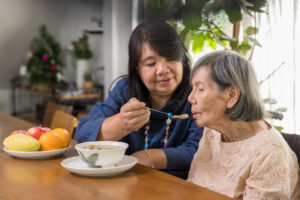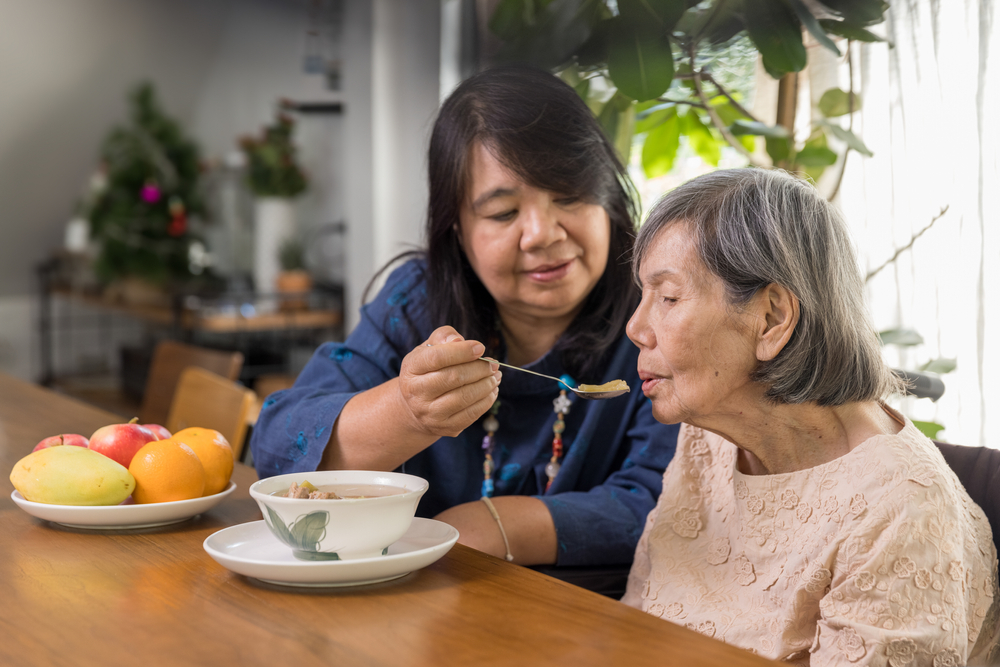Being a family caregiver is a challenging, yet rewarding role. With Medicaid’s funded CDPAP Program, family members can get paid to be caregivers to their loved ones, easing the financial strain and creating a better life balance for all.
Yes! You can get paid as a family caregiver.
You’ve noticed your elderly parents need more help, but balancing your own family and a full-time job makes stepping into a caregiving role seem way beyond your capabilities. In this scenario, the choice between a nursing home and getting home care is the next common consideration. Even if you wanted to take on the role of family caregiver, it can feel out of reach.
Thankfully, the New York State Medicaid CDPAP Waiver Program makes it easier for adult children to step in as family caregivers, allowing seniors to hire their family members to be their caregivers from the comfort of their own homes.
However, your loved one must first meet the following criteria:
- They live in New York State.
- They are enrolled in Medicaid. (Don’t have Medicaid or not sure you fit the criteria? We can help with that.)
- They are medically stable and require assistance with daily living activities
- They are self-directing or have a representative to direct their care.
Adult children who are family caregivers to aging parents choose the CDPAP program because:
- You get paid for your services
This is incredibly helpful if you need to leave a job to adopt the role of family caregiver.
- You don’t need specific training
It’s enough to follow the direction of your loved one receiving care or to oversee a third party as you provide services.
- You can help with medical needs
As a family caregiver, CDPAP allows you to administer medications, tend to simple wound care and monitor vital signs like blood pressure and temperature.
What is a Medicaid Waiver?
A Medicaid waiver is a program that allows states to waive particular Medicaid requirements, giving them more flexibility to help individuals receive care in their home or community, rather than the traditional hospital or nursing home. These waivers help individuals stay independent and access tailored programs that better meet their needs.
Medicaid’s Consumer Directed Personal Assistance Program (CDPAP) is a waiver program that allows family members, including adult children, to get paid for providing care to their elderly parents.
It’s important to note that different state-funded programs, like the NHTD Program, require different eligibility criteria to serve as a family caregiver. The Nursing Home Transition And Diversion Waiver Program helps seniors receive nursing-home-level care from professionals while remaining at home. Learn more about the NHTD Waiver Program..
Payment as a Family Caregiver
There are a few factors that affect the pay rate for family caregivers:
1. Waiver Program Guidelines
Every waiver program follows its own specific regulations and will have rules about maximum hourly rates. It’s a good idea to check the maximum hourly rate allowed for the CDPAP program, as the rules may change over time.
2. Experience & Qualifications
Any specialized training, certifications, or years of experience caring for others all may affect your hourly rate.
3. Levels of care
The levels of care your aging parents need may affect how much you’re paid. Complex needs may subject you to a higher pay rate, whereas basic care may be deemed a lower rate.
4. Dedicated time
The amount of time committed to family caregiving can also affect your hourly rate. Full-time caregivers may be subject to a higher hourly rate compared to part-time family caregivers.
The Role of a Family Caregiver
As an adult child of aging parents who require care, you play a vital role in ensuring they get the care and support they need to thrive. You may be responsible for all or some of the following tasks:
1. Shopping & Errands
Picking up groceries, making trips to the pharmacy, and running daily errands to ensure your elderly parents have everything they need for daily living.
2. Household Chores
Laundry, washing dishes, and generally keeping their home clean and functioning creates a healthy and safe living environment.
3. Hygiene & Personal Needs
Dressing, tying shoes, bathing, going to the bathroom, and teeth brushing are all tasks your elderly parents may need assistance with.
4. Driving to Appointments
Transporting your parents to and from medical appointments or for other errands is often a part of the family caregiving role. It also allows you to advocate on their behalf.
5. Managing Finances
Reviewing bills, paying expenses, and overseeing bank accounts might also be part of your caregiving responsibilities.
6. Day-To-Day Health Provider
Monitoring your parents’ daily health, activities, and emotional well-being is essential. This can include medication management, monitoring vital signs, and helping them keep active and social.
Americare Can Help
Getting paid to be a family caregiver through the CDPAP program can sound like a great — until you’re not sure where to start.
We’re a home healthcare agency that helps seniors and their families navigate the red tape of healthcare and make well-informed decisions to get the best care possible.
If you’re looking to get paid as a family caregiver or need help figuring out options for your elderly parents, reach out to Americare to speak to discuss your challenges.

